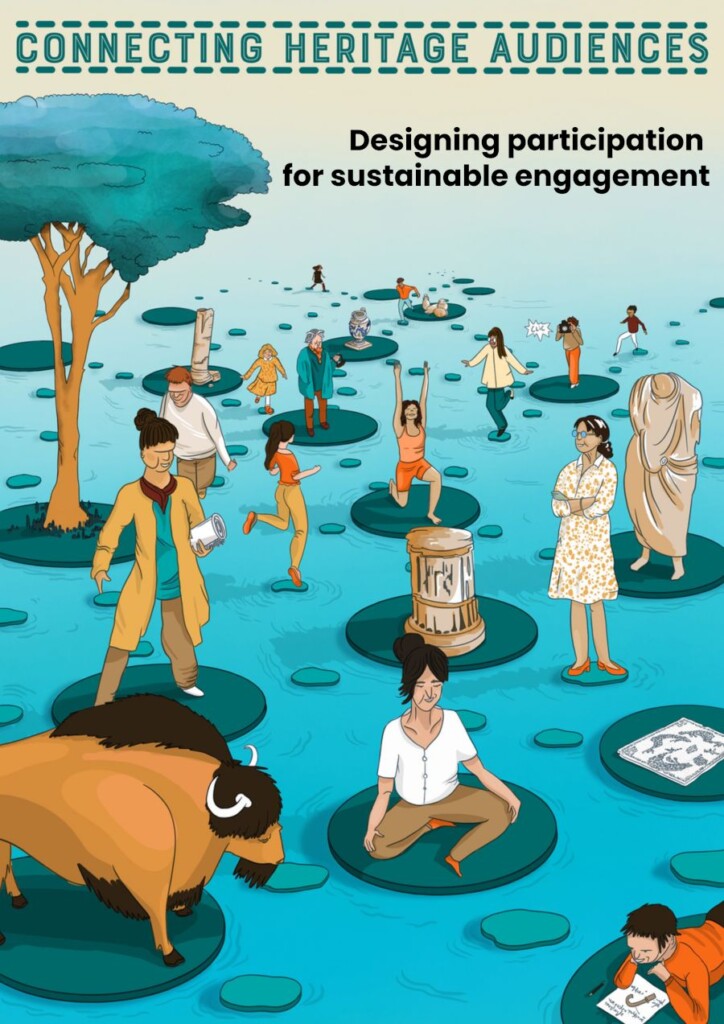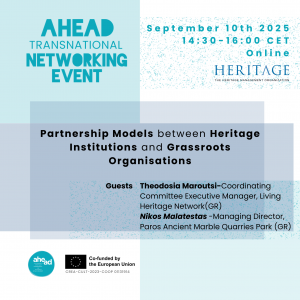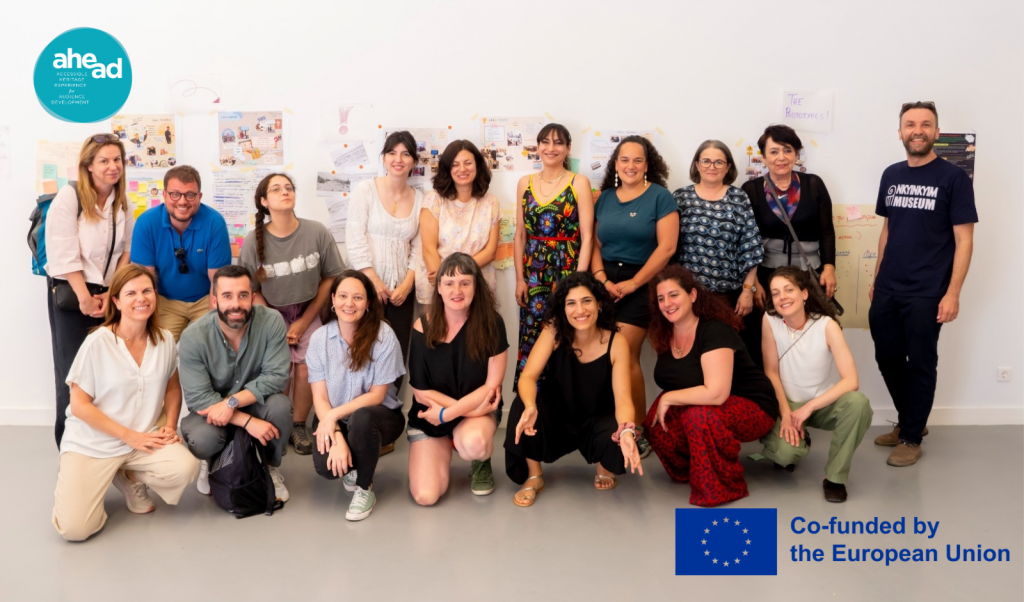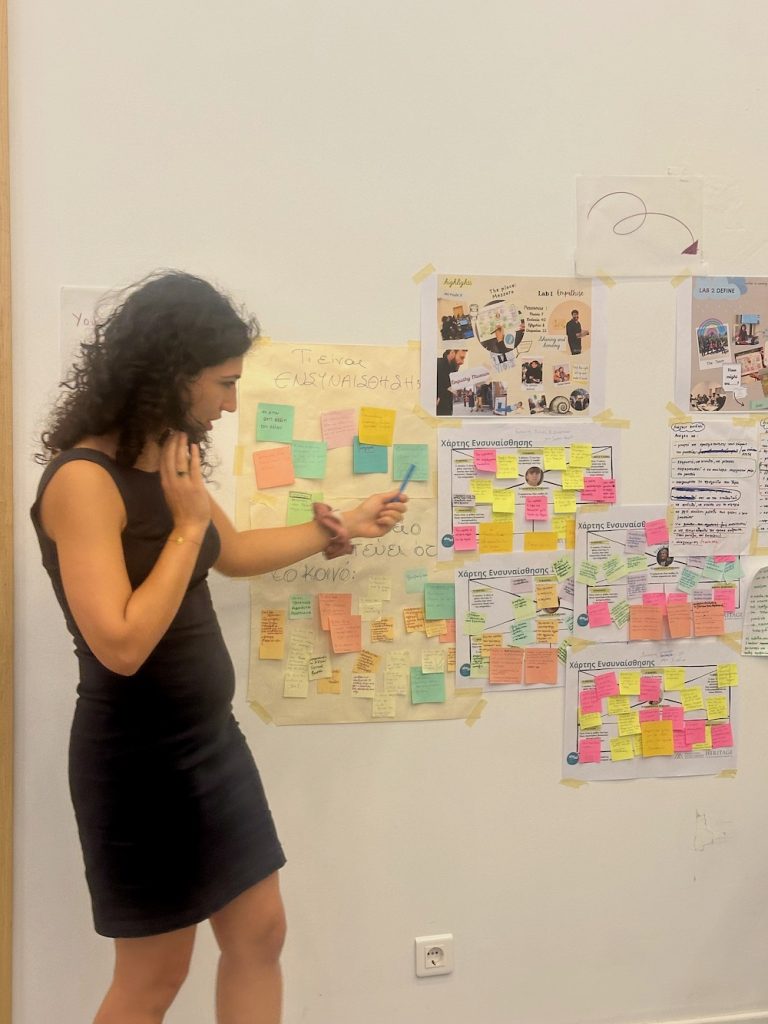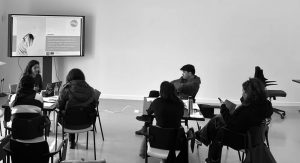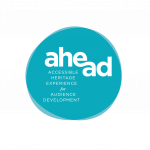Tag Archives: audience development
New Release: The AHEAD Magazine is Now Available!
HERITΛGE is proud to be part of the EU-funded AHEAD project, and today we’re excited to share the publication of the brand-new AHEAD Magazine — a comprehensive look back at our two-year journey transforming how audiences engage with cultural heritage.
This rich publication brings together insights, case studies, and reflections from the project’s three hubs — Ostia Antica, Altamira, and Messara. It highlights how participatory design and audience-centered approaches are reshaping heritage experiences across Europe.
Inside the magazine, readers will find stories of collaboration with local communities, innovative methods for capacity building, real examples of co-creation with cultural professionals, fresh perspectives on making heritage more accessible, inclusive, and engaging
Available in English, Italian, Greek, and Spanish, the magazine offers an inspiring look into the future of heritage interpretation and audience engagement.
HERITΛGE’s Roula Gkika and Theodosia Maroutsi (the latter in her capacity as a member of the Coordinating Committee for the Living Heritage Network) contributed to this publication, along with Elektra Angelopoulou, the artist selected to collaborate with the Greek Hub at the Archaeological Museum of Messara. HERITΛGE head of Public Programs, Aris Anagnostopoulos, was part of the editorial team.
Coralie Moy was commissioned by the AHEAD team to create the magazine cover and illustrations.
Find out more and download the AHEAD Magazine here.
AHEAD Multiplier Event in Athens
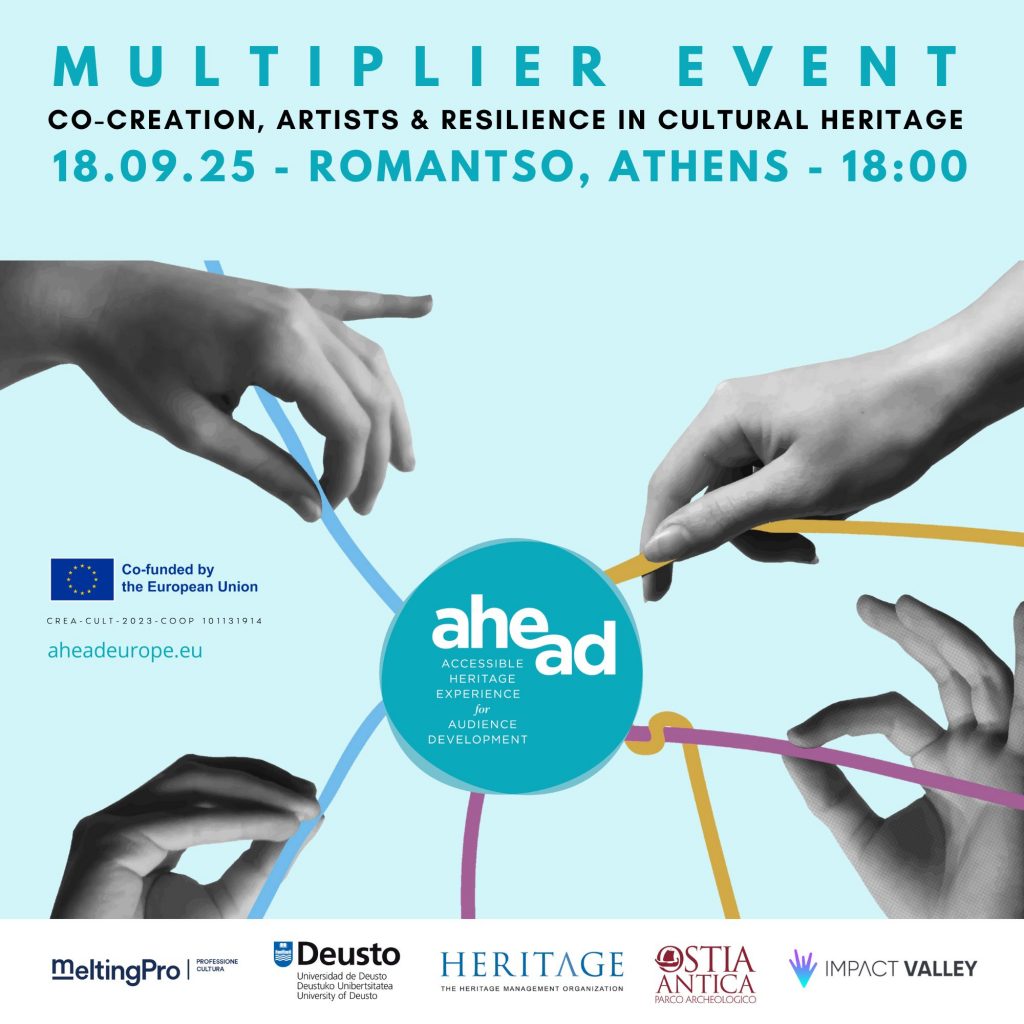
As we enter the concluding weeks of this inspiring project, the multiplier event will be an opportunity to share results, reflect on lessons learned, and celebrate achievements with the community. Over the past two years, HERITΛGE has worked with AHEAD’s Greek hub, the Archaeological Museum of Messara in Crete, on a wide range of activities — including labs, talks, and the development of prototype experiential museum experiences. An artist with ties to the location, Elektra Angelopoulou, was selected to co-create an experience with the local community and offer innovative insights.Through these collaborations, AHEAD explored innovative ways to engage local audiences and make heritage more inclusive, accessible, and participatory, with the dual aim of reaching new audiences and equipping cultural heritage managers with the skills to sustain them.
The evening will open with a presentation of the AHEAD project, its outcomes, and the use of design thinking for the development of cultural heritage audiences. Elektra Angelopoulou, will highlight the artistic dimension of the project, sharing insights into her co-creation work with local communities.
Participants will be invited to take part in an informal networking session over drinks and snacks — a chance to exchange ideas and forge new connections.
The AHEAD Multiplier Event will bring together cultural professionals, institutions, creative SMEs, NGOs, policymakers, and community members to discuss how heritage can become more accessible and relevant to diverse audiences.
We are delighted to celebrate the culmination of this important journey and to share AHEAD’s results with you, our partners, stakeholders, and the public.
Romantso Event Hall, Anaxagora 3, Athens
18 September 2025 | 18:00–19:30
Building Partnerships: HERITΛGE to Host 3rd AHEAD Networking Event
HERITΛGE, as a proud member of the AHEAD (Accessible Heritage Experience for Audience Development) Consortium, is delighted to announce that we will host the third in a series of AHEAD online networking events.
AHEAD, funded by the EU’s Creative Europe Programme, seeks to transform audience development in the cultural heritage sector by applying human-centred approaches, learning by doing, and impact- and data-driven methodologies. The project’s vision is to foster innovation in working practices, empowering the sector to become more relevant to our communities, more financially sustainable, and better able to create opportunities for social, cultural, and economic growth.
Following successful events organised in July by the University of Deusto and Impact Valley, HERITΛGE will lead the next exchange:
Date: Wednesday, September 10, 2025
Time: 14:30 – 16:00 CET
Format: Online (registration required)
Theme: Partnership Models Between Heritage Institutions and Grassroots Organisations
This session will explore how heritage institutions and grassroots, community-based organisations can build sustainable, innovative partnerships that strengthen both cultural heritage and local communities. Through case studies from Greece, the event will highlight practical insights, challenges, and creative approaches to networking that foster collaboration based on mutual respect and shared goals.
The online event will feature two guests: HERITΛGE’s Theodosia Maroutsi, who is also a member of the Coordinating Committee of the Living Heritage Network (Greece), and Nikos Malatestas, Managing Director, Paros Ancient Marble Quarries Park (Greece).
The session will be hosted by Aris Anagnostopoulos, HERITΛGE Head of Community Engagement
We look forward to welcoming trainers, heritage professionals, artists, and changemakers from across Europe and beyond to this vibrant discussion. Don’t miss the opportunity to connect, share, and co-create new ideas for audience development in cultural heritage!
Register here to join the event.
The fourth and final edition of the AHEAD online networking events will be organised by project coordinators MeltingPro. Stay tuned for details.
Παρουσίαση του έργου AHEAD στην Αθήνα
Καθώς το έργο πλησιάζει στην ολοκλήρωσή του, η εκδήλωση θα αποτελέσει μια ευκαιρία να παρουσιαστούν τα αποτελέσματα, να αναλογιστούμε όσα αποκομίσαμε και να γιορτάσουμε τα επιτεύγματα του AHEAD μαζί με την κοινότητα της πολιτιστικής κληρονομιάς της χώρας μας.
Τα τελευταία δύο χρόνια, ο οργανισμός HERITΛGE συνεργάστηκε με τον ελληνικό κόμβο του AHEAD, το Αρχαιολογικό Μουσείο Μεσαράς στην Κρήτη, για την υλοποίηση μιας σειράς δράσεων του έργου — εργαστήρια, ομιλίες και ανάπτυξη πρωτοτύπων βιωματικών εμπειριών για μουσεία. Μια καλλιτέχνις με δεσμούς με την περιοχή, η Ηλέκτρα Αγγελοπούλου, επιλέχθηκε να συν-δημιουργήσει μια εμπειρία με την τοπική κοινότητα και να προσφέρει καινοτόμες προσεγγίσεις. Μέσα από αυτές τις συνεργασίες, το AHEAD διερεύνησε νέους τρόπους ενεργοποίησης του κοινού, με διπλό στόχο: την ανάπτυξη νέων κοινοτήτων και την ενδυνάμωση των διαχειριστών πολιτιστικής κληρονομιάς με τις απαραίτητες δεξιότητες για τη διατήρησή τους.
Η βραδιά θα ξεκινήσει με μια παρουσίαση του έργου AHEAD, των αποτελεσμάτων του και της μεθοδολογίας design thinking για την ανάπτυξη κοινού στον χώρο της πολιτιστικής κληρονομιάς. Η Ηλέκτρα Αγγελοπούλου θα μοιραστεί εμπειρίες από τη συν-δημιουργία με την τοπική κοινότητα, αναδεικνύοντας την καλλιτεχνική διάσταση του έργου.
Η εκδήλωση θα κλείσει με μια χαλαρή συνεδρία δικτύωσης, όπου θα προσφερθούν σνακ και ποτά, δίνοντας στους παριστάμενους την ευκαιρία για ανταλλαγή ιδεών και απόψεων.
Θα χαρούμε να σας καλωσορίσουμε, να μοιραστούμε τις δράσεις του AHEAD και να γιορτάσουμε την ολοκλήρωση αυτού του σημαντικού ταξιδιού μαζί με εσάς — τους εταίρους, τους συνεργάτες και το κοινό μας.
Romantso, Αναξαγόρα 3, Αθήνα
18 Σεπτεμβρίου 2025 | 18:00–19:30
From Memory to Momentum: AHEAD Study Visit in Crete
From May 21st to 23rd, 2025, HERITΛGE and the Archaeological Museum of Mesara welcomed partners from across Europe for the second international AHEAD project Study Visit, a key milestone in the project’s mission to foster innovative, audience-centred cultural experiences. The three-day gathering hosted by the Museum (the project’s Greek Hub), proved a dynamic space for reflection, testing, and exchange of ideas across borders and communities.
The AHEAD team along with local heritage professionals and Elektra Angelopoulou – the artist selected to co-create work for the Greek hub- worked to validate and give feedback on the prototypes developed through the AHEAD methodology — a process designed to help cultural institutions understand their audiences, co-create with them, and embed those practices into their operations.
Two Prototypes, Two Publics
The Greek Hub focused on two distinct but equally vital local audiences: children and adults, engaging each group in a meaningful journey through AHEAD’s empathise–define–ideate–prototype–test framework.
Prototype I: Children’s Voices in the Museum
HERITΛGE and the Museum partnered with two local primary schools to involve young learners in the creative process. With the participation of artist/performer Elektra Angelopoulou, and through structured activities aligned with the AHEAD methodology, the children explored the museum’s collection and selected their favourite objects.From these choices, the children developed their own narratives — imaginative stories, reflections, and personal interpretations inspired by the artefacts.
In centering children’s voices, the museum embraces storytelling not just as education, but as connection — bridging past and present through creativity, wonder, and the eyes of a new generation.
Prototype II: Community, Connection, and Co-governance
In parallel, HERITΛGE invited local adults to participate in a series of reflective workshops, beginning with the sharing of memories, lived experiences, and deep-rooted connections to the Messara landscape — a place where archaeology, history, and daily life are inextricably linked.
These sessions revealed a strong sense of local pride, but also a disconnect: many felt the museum, though geographically close, was distant in spirit — shaped by state institutions without enough input from those who live nearby. In response, the prototype developed with this audience is the creation of a “Friends of the Museum of Mesara” Association.
This initiative aims to:
– Strengthen community engagement with the museum
– Amplify local voices in decision-making processes
– Support the museum’s role in driving tourism and sustainable local growth
– Provide a formal channel for co-creating future experiences and exhibitions
From Testing to Transformation
Both prototypes were presented to AHEAD consortium members during the Study Visit. Feedback sessions, held at the Archaeological Museum and visits to the area and its archaeological sites Gortyna and Phaistos, allowed partners to gain and exchange insights, and consider how these approaches might be adapted across other contexts.
The feedback underscored the importance of:
- Deep listening and long-term community involvement
- Rethinking traditional exchanges between museums and local communities
- Fostering sustainable links between heritage, education, and local development
- Working with the AHEAD methodology and returning to it as often as necessary throughout the lifetime of a project.
The prototypes — still in development — will be officially launched in September 2025, during a dedicated event that will also feature a site-specific performance by Elektra Angelopoulou, created in collaboration with the Mesara community.
Looking Ahead
This second Study Visit demonstrated the power of co-creation, memory, and local agency in shaping meaningful cultural heritage experiences. By validating the Greek Hub’s work and drawing lessons from the field, partners left Messara not only inspired, but equipped with ideas they could bring back to their own communities.
Next up for AHEAD: Study Visit 3 in Altamira, Spain — where a new chapter of audience-centred innovation is already unfolding.
AHEAD is co-funded by the European Union. To learn more about the AHEAD methodology or how to join the AHEAD network visit the project website and explore the learning resources, manifesto, and upcoming events.
AHEAD in Crete: Community Stories, Creative Sparks, and New Visions for Heritage Engagement
In February 2025, Crete became a vibrant hub for cultural dialogue and creative collaboration through two dynamic AHEAD project activities: the AHEAD Talk at the Archaeological Museum of Mesara and the third AHEAD Lab, held as part of our ongoing mission to foster accessible and participatory heritage experiences.
HERITΛGE is proud to be an active member of AHEAD (Accessible Heritage Experience for Audience Development), a project funded by the European Union’s Creative Europe initiative to give heritage managers the skills and knowledge to held their institutions generate economic sustainability and local growth while widening access and participation to new audiences and local communities.
AHEAD Talk: Memory, Meaning, and Messara’s Cultural Wealth
On February 14th, the Archaeological Museum of Mesara that serves as the project’s Greek Hub opened its doors to a diverse group of heritage professionals, educators, community members, and local stakeholders for the AHEAD Talk. Hosted by HERITΛGE and supported by the AHEAD consortium, the event focused on cultural heritage engagement and audience development, with a spotlight on the unique cultural landscape of Mesara.
Speakers included Aris Anagnostopoulos and Roula Gkika from HERITΛGE, artist Elektra Angelopoulou (who has been selected to co-create a piece of work for the Greek hub in collaboration with local communities, Antonis Papadakis from the Archaeological Museum of Mesara, and local educator Nikos Andreadakis. Speakershared inspiring insights on:
-
The aims and impact of the AHEAD initiative
-
Strategies for community-driven heritage projects
-
Art as a connector between archaeological sites and the public
-
Public archaeology and the use of comics for storytelling
-
Transforming museums into interactive, child-friendly spaces
Beyond the formal presentations, the event came alive through the audience’s contributions—personal stories and heartfelt memories of Mesara’s rich heritage that resonated deeply with all present. The talk fostered meaningful exchange, laying the groundwork for future collaboration between institutions and communities across Crete.
AHEAD Lab 3: Ideate! A Creative Leap in Audience Engagement
In parallel, Mesara also hosted the third AHEAD Lab, titled Ideate! that focused on reimagining how audiences interact with cultural heritage. Building on the themes raised during the Talk, the Lab brought together artists, archaeologists, educators, and local residents for a series of hands-on workshops and co-creation sessions.
Participants explored new methods of engaging audiences—especially young people—through artistic interpretation, participatory storytelling, and site-specific installations. The lab not only generated creative outputs but also deepened local involvement, highlighting the power of collaborative design in shaping inclusive cultural experiences.
Together, the AHEAD Talk and Lab in Crete demonstrated the transformative potential of dialogue, memory, and creativity in heritage work. By listening to communities and co-creating new forms of engagement, AHEAD continues to push the boundaries of how we connect with the past—and with each other.
Find out more about AHEAD on the project’s website.
- 1
- 2

